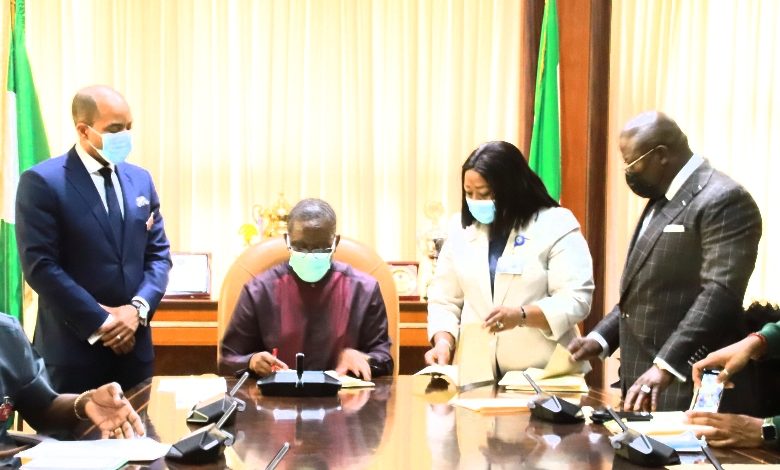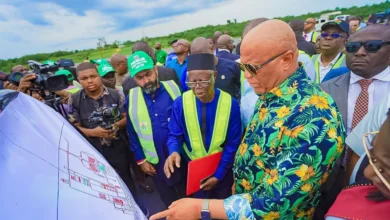
By Kelvin Ohoror
Governor Ifeanyi Okowa of Delta on Thursday in Asaba assented to the state’s 2022 Appropriation Bill of N479 billion.
The governor also signed five other Bills, including Delta State House of Assembly Service Establishment Bill 2021, Delta State Registration of Community Development Associations Bill 2021, Delta State Debt Management Bill 2021, Delta State Erosion and Watershed Management Bill 2021 and Asaba Specialist Hospital Bill, 2021.
Signing the Appropriation Bill, Okowa assured Deltans that the state would strive to implement capital projects embedded in the 2022 budget as well as complete all ongoing projects before the end of his tenure.
He commended the House of Assembly for the speedy passage of the bill, and said that his assenting to the Bill before the end of December would avail the state government the opportunity to further plan towards its implementation from January, 2022.
“You just witnessed the signing into law of six bills that were passed by the House of Assembly this last quarter of the year, 2021.
“We thank God for the good work the House has done; the very important one is the Delta State Appropriation Bill 2022, now signed into law.
“I must thank the House for giving speedy attention to the Bill because with the signing into law today, it will help us to plan and to start early in 2022.
“I do know that it went through a full legislative process and I must thank the House for the great job that they did which enabled us to pass the Bill on the 30th of November.
“I want to reassure Deltans that we will continue to do our best. We are very much aware that there are financial challenges in the country today, but we will continue to do our best within the limits of the resources available.
“We are very much hopeful that there will be a turnaround in 2022, and I hope that we will be able to execute the capital projects that are contained in our budget, both the new ones and the ongoing before the end of our tenure,” he said.
On the Delta State Erosion and Watershed Management Agency Bill, Okowa said that the law would enable the government to tackle erosion and flooding issues in the state head-on.
“I want to also appreciate you for the passage of the Delta State Erosion and Watershed Management Agency Bill, signed into law today.
Also Read: Azuka Benson heads Ohanaeze Ndigbo UK transition committee
“We are very much aware that there is a lot of devastation in the ecosystem in some parts of our state. This is following through the advice that was given to us by the World Bank.
“We can now actually focus more on dealing with flood and erosion challenges across the state,” he said adding that the Delta State House of Assembly Service Commission Amendment Bill was very important for the smooth running of the service of the House of Assembly.
On Asaba Specialist Hospital Bill, the governor said that the law was very key to the effective management of the hospital to enhance universal health coverage in the state.
“This law is very important to us because we have decided that there is a need to have a separate law governing the establishment of this hospital.
“And, I can attest to the fact that there is a lot of decency and commitment in the management of the hospital.
“There’s obviously a public-private partnership in the management of the hospital and I know that it’s been helping our people a lot.
“They have rendered quality services to the people since they opened for operation in 2020 and I thank God for the basic and specialist health services they have provided for Deltans and non-Deltans who live in the state.
“One needs to visit the hospital and see the number of patients being attended to on daily basis; so, I want to thank the lawmakers for the passage of the Bill which has been signed into law,” he stated.
Okowa said Delta State Debt Management Law seeks to regulate and manage the State’s borrowing and debt portfolio in line with international best practices, explaining that “It seeks to establish the Debt Management Department in the Ministry of Finance.
“It is one of the requirements to ensure the functionality of the Ministry of Finance as it concerns the debt management of the state.
“It is our hope that this particular department would be able to manage the debt of the state even beyond my tenure.”
He lauded the Assembly for the prompt passage of the Bill to regulate the activities of community development associations in the state.
“Another important bill is the one to regulate the activities, operations and leadership structures of development association in the state.
“Like the Speaker had earlier said, there are many of our communities where people tend to ignore even the constitutions written by the communities and lord themselves over other persons in the community.
“This bill will enable us have some levels of regulation over what happens in our community development associations.
“To make them more functional and to ensure that these associations are tenured and that people will no longer lord themselves over others in the communities, even against the constitution that brought them into power.
“I thank the House of Assembly by ensuring that these six bills were passed this end of year. You have done quite a lot for us,” he stated.
Presenting the Bills, the Speaker of the Assembly, Chief Sherrif Oborevwori, said that the Bill went through all legislative processes before being passed.
He said that with the timely presentation of the Appropriation Bill, 2022 and its subsequent passage by the House, the State was on a good start for year 2022.
“I am confident that the budgetary provisions for 2022 will meet the yearnings of our people and the developmental needs of the State, because it is indeed a realistic budget,” he said.
On the passage of Debt Management Bill, the speaker said the State had complied with the requirements of the World Bank’s State Fiscal Transparency, Accountability and Sustainability (SFTAS) Programme, and the World Bank Disbursement Linked Indicator 7.




